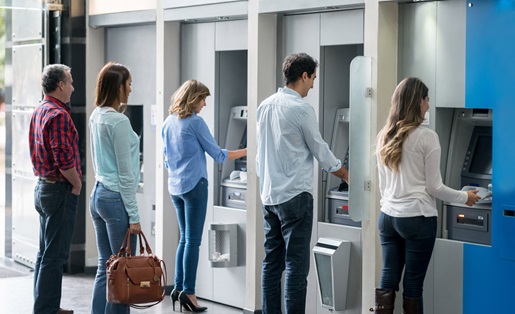Looking to digitize your product or service? Let these examples of digitization in business inspire you.
Digitization is more than a convenience for businesses and consumers — it is a common expectation. Studies from McKinsey reveal the share of digitized products and services recently reached or surpassed 50% in every region as the global average continues to rise. The question today is not whether businesses will offer digital services, but when.
So what is digitization of business services, and how can non-digital companies pursue them? To answer this question, we’ll highlight digitization processes from several industries to explore how they reduce costs and increase profits.
Want to know more about upgrading your products and services? Check out The Executive's Guide to Digitization in Business.
What is digitization of business services?
Digitization of business services is the act of taking physical media used for business purposes and converting it into a digital format. This usually involves scanning paper documents into digital files that can be stored on computer systems for later reference. In practice, digitization encompasses a broad range of use cases, such as:
- Decreasing processing time for paperwork-heavy departments such as accounts receivable and payable.
- More efficient onboarding of customers for new financial accounts or loans.
- Streamlining government services that require extensive documentation, such as passport registration and taxes.
Digitization should not be confused with business digitalization, which is the implementation of business models that rely on digital processes. However, digitization can be part of digitalization since most companies need to convert existing physical documents during the transition.
What are the advantages of digitization in business?
Cost-effective document management
One immediate and tangible benefit of digitization is documents that once required physical space are now stored on hard drives and servers. Even more significant is the downstream impact on business costs. Paper, filing cabinets, and floor space all have associated costs that drain budgets, even before considering labor and file management.
Digitization eliminates these fees by refocusing efforts on data storage. For example, a business might choose to upload documents to a cloud provider or store records on a local network, rather than pay to provide the physical needs to house them.
Improved accessibility and collaboration
Digitizing paperwork improves efficiency in workflows by accelerating processes, eliminating unnecessary steps and allowing for easier access. These time savings quickly add up on an organizational scale. Most notably, searching for documents on local networks is faster than browsing physical records by hand or reading for specific details. These digital records can also be viewed by multiple parties at once, eliminating the need for photocopies or waiting until a particular document is available to use.
Improved security
In most respects, protecting private or confidential information is far easier when it’s stored in a digital format. For example, network administrators at any business can assign file permissions to ensure that only authorized employees can access them. Digital records can also be encrypted or password protected as an additional security measure. Finally, while physical documents can be lost, stolen, or destroyed, digital copies can be backed up at secure locations and retrieved as necessary.
Did You Know?:The ScanSnap family of scanners specializes in versatility and ease-of-use at an affordable price. Click here to learn more.
What are some successful digitization in business examples?
Arata Certified Tax and Accounting Services
Arata Certified Tax and Accounting Services is a leader in electronic tax declarations in Japan, but it still has extensive paper records. The firm formerly created trial balance sheets manually, entering data from customer source documents — such as receipts and invoices — taking up 480 hours per month for each sales employee.
In order to modernize its processes, Arata began digitizing documents so that a third-party cloud service could automatically process the converted files. This approach freed Arata employees from rote manual data entry while decreasing document turnaround to a single business day. As a result, the firm could dedicate more time to consultations and client acquisitions.
Burbank Sportscards
Burbank Sportscards may deal in physical goods — specifically, buying and selling trading cards — but almost 80% of its operations occur online. Before fully moving into digitization, that meant hours scanning cards and cropping images using flatbed units. With the fi Series automated scanning technology, Burbank Sportscards could process cards in a fraction of the time while guaranteeing a high-quality scan.
Thorndike Medical Centre
Thorndike Medical Centre manages a high volume of subject access requests and medical report requisitions daily. Serving 13,000 patients means processing and redacting these documents can be tedious and time-consuming. The fi Series digitization technology made it possible to scan 60 pages per minute per scanner and electronically deliver compliant requests to the appropriate parties, significantly improving staff efficiency while reducing printing and postage costs.
Belvedere Hotel
New York’s Belvedere Hotel guests had to wait for long periods while hotel staff manually processed guest information. These processes were inefficient, prone to human error, and increased the risk of payment and security issues.
To address these concerns, Belvedere Hotel created a digitization system that interfaced with its property management software. This process lets employees scan government-issued IDs and passports, automatically extracting relevant information to streamline data entry. As a result, guests could check into the hotel faster, while employees gained access to reliable records when resolving payment disputes.
Lipari Foods
Lipari Foods procures, manages, and delivers tens of thousands of food and beverage items to customers in more than half of the United States. With at least 350 unique document types to track, Lipari’s offices in Warren, Michigan were formerly home to no less than 250 filing cabinets, making it difficult for employees to access the info they needed wherever they were working.
By bringing in a fleet of fi Series scanners in combination with business process automation software, Lipari was able to empower employees to scan their own documents quickly and easily — streamlining paperwork catchup from a ten-person task performed across several days to a single person completing the job in under two hours. The scanners reliable hardware and central administrative capabilities mean Lipari can keep growing without filing cabinets full of paper weighing it down.
Did You Know?:We offer a full assortment of accessories and replaceable parts to make sure your scanner is functioning at its best for years to come. Click here to learn more.
Scanners to fulfill your business’ digitization needs
Those in the market for document scanners have no shortage of options. We take great pride in having spent the last 50+ years researching, designing and developing some of the most advanced and powerful electronics in the world, including our professional grade fi Series scanners; Each of the digitization in business examples described above was handled through the use of our document scanners.
Built to purpose for the most demanding document handling jobs, fi Series scanners are capable of processing tens of thousands of pages per day at high levels of accuracy and reliability. Their intuitive integration capabilities with existing work suites minimize time-to-value for businesses looking to invest in tools that will pay dividends for years to come. Click here to learn more or shop the rest of our production scanner line.










